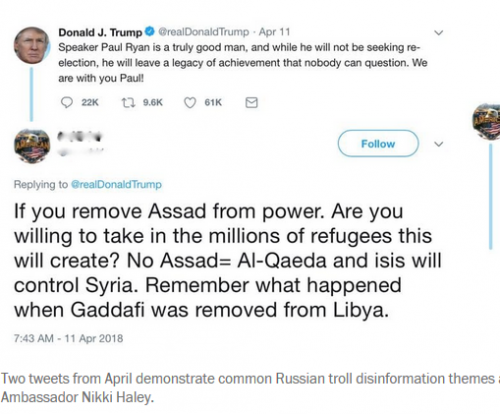U.S. using Ukraine to threaten Russia
Tensions are rising fast in the northern Black Sea and the U.S. has taken sides.
Ukraine announced plans to establish a naval base along the Sea of Azov, a move that came a day after the U.S. said it is mulling more military assistance for Kiev to counter Russia’s actions.
...Kurt Volker, the U.S. special envoy, said in Kiev on Saturday that the Trump administration was open to giving the country more lethal weaponry to address capability gaps. Earlier this year, the U.S. provided Ukraine with 210 anti-tank Javelin missiles to support government forces fighting Russian separatists in Ukraine’s east.
The problem stems from when Russia completed the bridge over the Kerch Strait between Russia and Ukraine’s Russian-occupied territory of Crimea. Russia built this bridge after Ukraine cut off land transport to Crimea in an effort to starve them out.
With the enormous bridge completed, Ukrainian nationalists threatened to blow it up, so Russia responded.
With the entrance to the sea under its full control, Russia also started interrupting freight traffic in the region. According to Ukraine’s minister for infrastructure Volodymyr Omelyan, as of July 17 Russian forces had stopped and boarded as many as 148 ships sailing to Ukrainian ports, primarily to Berdyansk and Mariupol, detaining them sometimes for several days.This effective blockade as decreased the flow of shipping by 10 percent for Mariupol and by over 20 percent for Berdyansk, Omelyan said on Aug. 31.
Yes, Russia searched the boats sailing under the bridge for explosives. America has portrayed this as a "blockade".
The Ukrainian government on Sept. 12 also approved the signing an agreement to accept two U.S. Island-class patrol boats as free military aid from the United States.
This is only the latest of several alarming steps taken by Ukraine recently.
Ukraine has decided to terminate the 20-year old Russian-Ukrainian Treaty on Friendship, Cooperation and Partnership.
Meanwhile, Ukraine has pushed forward with their efforts to join NATO.
At the same time, Washington is pushing sanctions to the point of calling it Economic Warfare.
“We are going into a different phase now,” says one senior Obama-era official who was directly involved in drafting sanctions against Moscow between 2014 and 2016, and who is not authorized to speak on the record. “The original intent was to show [Putin] how closely interlinked the Russian economy was to the global economy, not to shut down the Russian economy. The idea was to stop further Russian aggression” in Ukraine. But now, four years on, the political climate in Washington has changed. “After the [2016 electoral] hacking the mood has become ‘Punish Russia as hard as possible. Turn the screws all the way.’”
...
Effectively, the U.S. is on course to brand Russia a state sponsor of chemical weapons terrorism alongside North Korea and Iran.As a result, Russia can no longer receive high-tech U.S. goods, such as superfast computers, state-of-the-art oil exploration machinery and lasers. The measure is intended to hit the economy where it hurts the most: in the oil extraction and arms industries.
Russia has already dismissed the idea of allowing inspectors. So come November, the Treasury is expected to turn those screws even tighter, and that could include Iran-style restrictions on Russian banks and companies doing business in the West.
There's just one little problem: These sanctions will be all unilateral. Our allies will not be taking part in them.
And that is dangerous, because if we unload with total economic sanctions, and Russia continues to defy us, what will Washington do next? Russia is uniquely situated to outlast our sanctions.
Macroeconomically, Russia, with unemployment at a record low, modest inflation and $400 billion of international reserves, is unlikely to collapse before the U.S. unleashes a global energy or debt crisis that could prompt its allies to desert it.If less than maximum pain is applied, Russia could manage for years with relatively low growth. That is the basis for Putin’s calculations. It bodes badly for the current direction of U.S. policy. If Washington inflicts as much pain as it can — and nothing changes — it will be a painful failure for the superpower.
Almost none of our allies have joined us in the last round of Russian sanctions, while they are in open revolt against our unilateral Iran sanctions.


Comments
Truth = Fake News
Gotta love the WashPost

Except that the tweet is demonstratively true and completely logical.
gjohnsit, I hope
you are right that Europe will not support regime change in Russia or anywhere else on behalf of the Project on the New American Century, the Merchants of Death.
"Ukraine’s Russian-occupied territory"? Really?
Crimea was not part of Ukraine until Nikita Khrushchev made the self-serving gesture of handing it over to them in the 1950s. Before then it had been basically a Russian naval outpost for 200 years.
Raving about "Crimea", while ignoring or even blatantly supporting Guantanamo, is blatant hypocrisy of the worst kind.
There is no justice. There can be no peace.